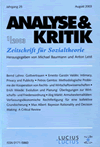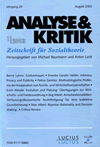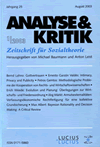Suchergebnisse
"Julian Culp"
Titel: G. A. Cohen, Constructivism, and the Fact of Reasonable Pluralism
Autor: Julian Culp
Seite: 131-147
In this article I argue that G.A. Cohen is mistaken in his belief that the concept of justice needs to be rescued from constructivist theorists of justice. In doing so, I rely on insights of John Rawls’ later work Political Liberalism and Rainer Forst’s discourse theory of justice. Such critical engagement with Cohen’s critique of constructivism is needed, because Cohen bases his critique of constructivism almost exclusively on Rawls’s arguments and positions in A Theory of Justice. He thus neglects at least by and large that Rawls had further developed his constructivist method of justification in his later work Political Liberalism, as well as that Forst’s discourse-theoretical works offer elaborate versions of constructivism. These refined versions of constructivism recognize a plurality of reasonable conceptions of ideal justice and draw an important distinction between moral and political constructivism. Because of these features these advanced constructivist theories are not in need of Cohen’s rescue.
Titel: Comment on Lukas Meyer and Pranay Sanklecha: Individual Expectations and Climate Justice
Autor: Julian Culp
Seite: 473-476
Titel: Reciprocity in Economic Games
Autor: Julian Culp / Heiner Schumacher
Seite: 349-364
Abstract: The evidence of laboratory experiments of behavioral economists shows that individuals behave reciprocally. These data put into question the pure self-interest thesis of human motivation of the homo oeconomicus model and call for alternative models. Focusing on the explanation of reciprocal behavior in Trust Games, this article proposes two directions that economists and other social scientists might want to consider in order to establish a more solid foundation for economic theory. First, it presents models that economic theorists developed to explain the laboratory evidence of reciprocal behavior. It highlights that all of these models subscribe to the Humean view that desires are at the source of any human motivation and suggests an alternative Kantian model where reasons have the capacity to motivate human action. Second, it emphasizes that a supplementary examination of the social background conditions would illuminate the analysis of the findings because of the connection between the 'local' and society-wide demands of reciprocity.
Titel: What Can we Learn from ‘Postmodern’ Critiques of Education for Autonomy?
Autor: Julian Culp
Seite: 373-392
Lyotard defines being postmodern as an ‘incredulity toward meta narratives’. Such incredulity includes, in particular, skepticism vis-à-vis Enlightenment ideals like autonomy. Motivated by such skepticism, several educational scholars put into question education for autonomy as it is practiced in the formal settings of national school systems. More specifically, they criticize that practices of autonomy education can have certain normalizing and ideological effects that undermine the aim of creating autonomous subjects. This article examines these critiques of education for autonomy and argues that they are best understood as calls for reforming educational practices, and not as outright rejections of education for autonomy. Thus, since the allegedly ‘postmodern’ critiques of autonomy education cannot be plausibly understood as radical ruptures with Enlightenment ideals, the article concludes that these critiques represent (merely) constructive self-critical reflections on what Habermas dubbed the ‘unfinished project of modernity’.

The Normative Turn from Marxism
2015 (37) Heft 1
Editorial
Marxism, both as a Western political movement and an intellectual focus of dispute, lost its academic appeal during the 1970s and 80s, foreshadowing the collapse of `actually existing´ socialism in the early 90s. Within what after the Second World War was called `Western Marxism´, there had been growing awareness of Marx’s early philosophy with its suggestive, if somewhat vague, ideas of a universally productive life and an ideal productive society. In contrast, the stock of (not only offici...

The Relevance of Ideal Justice
2011 (33) Heft 2
Guest-Editors: Lukas Meyer / Pranay Sanklecha
Editorial
Whether and how normative theorising can be relevant for guiding people’s actions is one of the classical questions of moral and political philosophy. Platon’s dialogues Politeia, Politikos and Nomoi provide fascinating discussions on the topic. Recently normative theorists have investigated some aspects of these questions under the title of ideal and non-ideal theorising—relying on a distinction that Rawls introduced in A Theory of Justice (1971) and made use of in his The Law of Peo...

Work and Cooperation
2011 (33) Heft 1
Editorial
Both in social theories with the aim of looking into the creative core of society as well as in everyday politics, two intuitions often supplement each other. The first intuition, empirico-analytical, views common organization of work and production as being the very aim of society, and other parts of society being explicable from this. A second intuition, ethical or moral, holds the sphere of work to be the central site for diagnoses of a society's inherent justice. Both intuitions not only con...